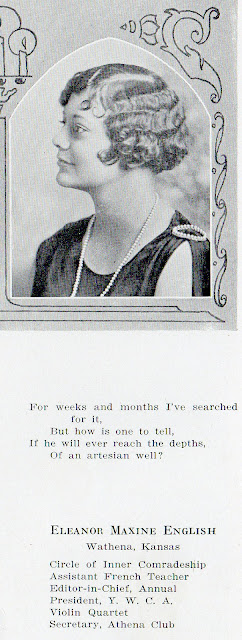by Rebecca J. Becker
In 1930, the graduating class peered ahead fifteen years into the future - - all the way to Valentine's Day, 1945.
We thought it might be fun for you to look over their shoulders, and see what they predicted!
Here, directly from the pages of the 1930 Crescent College yearbook - - with portraits of the key players added, for your delight - - we bring you:
---------------------------------------------------------------------------------
Hearts
THE CRESCENDO
FEBRUARY 14, 1945
-------------------------
VOLUME 16, ISSUE 20
------------------------------------
FACULTY ELECTED FOR
FEMALE ACADEMY
Two former Crescent students are to be on the faculty of the new Flipville Female Academy. This school will specialize in Physical Culture and all of its faculty are selected from specialists in this field.
Winifred Ingalls is to be Dean of Women,
 |
| Babe Doan |
while Babe Doan will be head of the Physical Culture department.
ACTRESS SUED FOR ALIENATION
OF AFFECTION
 | ||
| Marian [or Marion] Farmer |
Marian Farmer, well known screen star, is being sued...
 |
| Dixie Gleaves |
...by Dixie Gleaves for $50 for the alienations of affections of a certain young man whose name is withheld.
 |
| Zanona [or Zip] Gallaher |
The case is being tried before Judge Zip Gallaher.
FLAG POLE SITTER
STILL SITS*
Sammy Sammons, the flagpole sitter, is now on her thirty-seventh day aloft. She still steadfastly refuses to speak or to eat. So great has been the attention...
 |
| Marji Little |
...that Governor Marji Little has been compelled to call out the state militia...
 |
| Johnny Christelle [or Chris] Simmons |
...under the leadership of Colonel Chris Simmons to keep order.
FORMER CRESCENT STUDENTS
SAIL FOR EUROPE
When the Berengaria sailed today, several former Crescent students were among the passengers.
 |
| Stella Mae Hanna |
Stella Mae Hanna, missionary to Turkey, and her assistant...
 |
| Aimee Semple McPherson** |
...Aimee McPherson, have sailed for France where they expect to pick up some new points about sin that will help them in their work.
 |
| Lillian O. Brown |
Lillian O. Brown also is Paris bound. She is going over for her fifth divorce. her former maid...
 |
| Frances Marion Shannon |
...Marion Shannon, created a sensation yesterday when she attempted to stab Miss Brown, whom she accused of having "taken her man."
PATENTS AND COPYRIGHTS
GRANTED
 |
| Eleanor Maxine English |
A patent has been granted to Maxine English for a noiseless alarm clock, which will ring without disturbing anyone's slumber.
 |
| Sylvia Bobkoff |
Copyrights have been issued to Sylvia Bobkoff for her "New English Dictionary"...
 |
| Agnes Soule |
...and to Agnes Soule whose latest volume of poetry is being published by...
 |
| Rebekah Eva Burk |
...the Becky Burk Publishing Co.
TWO DEMONSTRATIONS TO BE GIVEN
IN EUREKA SPRINGS
Friday and Saturday of this week Walker Bros. will have demonstrations of merchandise at their store.
 |
| Elizabeth Davidson |
Sleep-ezy mattresses will be demonstrated by Elizabeth Davidson.
 |
| Virginia Reid |
The Virginia Reid line of toilet goods will be demonstrated...
 |
| Mary Jo Smith |
...by Mary Jo Smith-Floginsky.
VAUDEVILLE AT
COMMODORE THEATRE
A varied program of vaudeville acts will be presented at the Commodore Theatre all this week at no increase of regular prices. One act will be a boxing match...
 |
| Felice Bryan |
...between "Flea" Bryan...
 |
| Mabel Matney |
...and "Gnat" Matney, two of the best fighters in the flyweight division.
 |
| Martha Ruth Crockett |
Martha Ruth Crockett will do a trapeze act...
...while Cora Lightfoot-Jilson,*** famous comedian, will do a song-and-dance.
 |
| Billie Hanna |
At the close of the program, Mrs. Billie Hanna Coleman Dix Forbes Mix Hamilton, National president of the W.C.T.U.,**** will make a short talk on the "Melachrino Menace."*****
---------------------------
*Flagpole sitting was one of the most bizarre fads to sweep the nation in the 1920s. By 1930, the craze was nearly over - - except for Dorothe [Sammy] Sammons, of course!
**Aimee Semple McPherson was a Canadian American Pentecostal evangelist, tremendously popular in the 1920s and 1930s.
***A reference to Al Jolson, known at this time as the "World's Greatest Entertainer."
****W.C.T.U. was the Women's Christian Temperance Union, one of the most powerful forces in the national battle over Prohibition.
*****Melanchrino Menace has us stumped. We'll keep you posted if that changes!
**Aimee Semple McPherson was a Canadian American Pentecostal evangelist, tremendously popular in the 1920s and 1930s.
***A reference to Al Jolson, known at this time as the "World's Greatest Entertainer."
****W.C.T.U. was the Women's Christian Temperance Union, one of the most powerful forces in the national battle over Prohibition.
*****Melanchrino Menace has us stumped. We'll keep you posted if that changes!

































